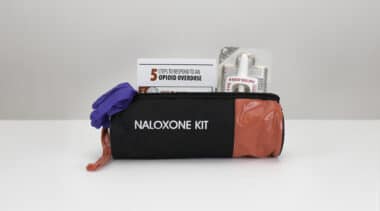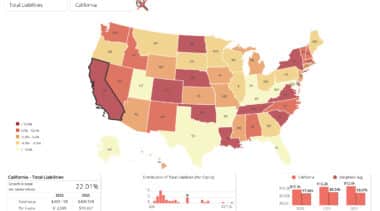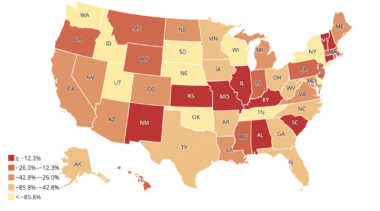Geoffrey Lawrence is research director at Reason Foundation.
Lawrence has been a financial executive in both the public and private sectors and has served as chief financial officer of publicly traded, growth stage, and startup manufacturing and distribution companies. He was CFO of Players Network, the first fully reporting, publicly traded marijuana licensee to be listed on a U.S. exchange, CFO of C Quadrant, a startup manufacturer and distributor that was subsequently sold to Lowell Farms (LOWL), CFO of Apex Extractions, a manufacturer and distributor based in Oakland that he helped take public, and, most recently, CFO of Claybourne Co., a top-3 flower brand in California by market share. Through these roles, Lawrence raised capital, planned capital expenditure, prepared financial forecasts, implemented systems for accounting and inventory control, designed internal control processes, managed monthly and quarterly closings and reporting, managed compliance with state and local regulations, negotiated contracts, and prepared filings with the U.S. Securities and Exchange Commission.
Lawrence also served as a senior appointee to the Nevada Controller’s Office, where he oversaw the state’s external financial reporting. Prior to joining Reason Foundation in 2018, Lawrence had also spent a decade as a policy analyst on labor, fiscal, and energy issues between North Carolina’s John Locke Foundation and the Nevada Policy Research Institute.
Lawrence is additionally the founder and president of an accounting and advisory firm with particular expertise in the licensed cannabis industry and public markets.
Lawrence holds an M.S. and B.S. in accounting from Western Governors University, an M.A. in international economics from American University, and a B.A. in international relations from the University of North Carolina at Pembroke. He lives in Las Vegas with his wife and two children and enjoys baseball and mixed martial arts.
-
Proposed Model Policy: “Veterans Mental Health Innovations Act”
This model legislation is intended to authorize state ibogaine research and participation in a larger multistate effort to complete a supervised clinical drug trial.
-
Model legislation would authorize groundbreaking research into ibogaine for mental health
Growing research has demonstrated the promise of ibogaine in treating a wide range of intractable conditions, which could benefit veterans.
-
Harm reduction: An evidence-based approach to the drug war
Harm reduction includes proven tools like naloxone distribution, syringe service programs, fentanyl test strip access, and supervised consumption sites.
-
The truth about marijuana, mental illness, and violence: A review of Alex Berenson’s claims in ‘Tell Your Children’
Marijuana legalization appears to reduce the prevalence of violent crime and suicide.
-
Drug decriminalization in Oregon: Measure 110’s impacts compared to other countries’ systems
A review of the data does not indicate any massive shift in offense rates or criminal behavior as a result of Measure 110.
-
Optimal framework for the state regulation of hemp cannabinoids
The hemp cannabinoid market has grown into a $3 billion interstate industry.
-
New Mexico Senate Bill 219 would regulate medical psilocybin access
The Medical Psilocybin Act would create a regulated system to allow patients with qualifying conditions to access and use psilocybin.
-
Legalizing psilocybin access in Arizona would benefit mental health
Arizona Senate Bill 1555 would create a regulatory framework for limited, legal access to therapeutic psilocybin services.
-
Psychedelic treatment for neurodegenerative disorders
Recent research suggests that psychedelics, such as psilocybin and LSD, show strong potential as effective treatments for neurodegenerative disorders.
-
Debt trends for state and local governments 2020-2022
This tool provides debt and spending insights for the 100 largest municipalities, counties and school districts in America and all 50 states for fiscal years 2020, 2021 and 2022.
-
City debt: New York has more than four times the liabilities of Chicago, Los Angeles, Houston and other cities
New York City, the District of Columbia, Chicago, Atlanta, Yonkers and Austin have the most per capita liabilities.
-
County debt: Los Angeles, Miami-Dade and Cook counties among worst in nation
Los Angeles County had $54 billion in liabilities at the end of 2022. Miami-Dade County had $29 billion in total liabilities.
-
State debt: California, Illinois, New York, New Jersey and Texas each have over $200 billion in total liabilities
On a per capita basis, Connecticut's $27,031 total liabilities per capita are worst in the nation, followed by New Jersey.
-
Psychedelic drug policy recommendations for the incoming Trump administration
The incoming Trump administration has promised sweeping reforms, and that might include reversing the federal suppression of psychedelics.
-
A framework for federal and state hemp-derived cannabinoid regulation
The growing popularity of hemp-derived products has stimulated significant legislative attention in recent years, with over 90 regulatory proposals introduced in state legislatures in 2024 alone.
-
Getting cannabis legalization right in Hawaii
Hawaii may be poised to become the 25th state to legalize the recreational use of cannabis for adults aged 21 and over.
-
Ibogaine treatment for opioid use disorder
Policymakers should consider ibogaine as a potential alternative treatment for opioid use disorder.
-
Regulated psilocybin access in Arizona would help treat mental health conditions
Arizona Senate Bill 1570 would create a regulated and limited program to access psilocybin.


















